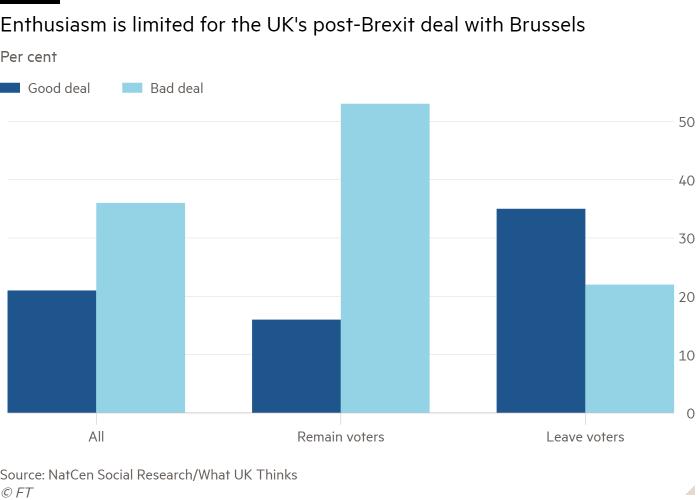[ad_1]
Nigel Farage predicted “an earthquakeâ€: five years after Britain voted to leave the EU and six months after Brexit took full effect, the Batley and Spen by-election on Thursday is expected to produce further evidence that the aftershocks are still reshaping the UK’s political landscape.
The pro-Brexit Conservatives are odds-on favourites to win the West Yorkshire seat — where 60 per cent backed leaving the EU in 2016 — from Labour. Defeat would intensify party criticism of Labour’s pro-European leader Sir Keir Starmer, who had previously hoped to overturn the referendum result.
But while Brexit is seen today primarily as a Labour problem — particularly in the party’s northern heartlands — Boris Johnson’s Conservatives have fared relatively poorly recently in Remain areas in the south of England, suggesting a more complex picture at the next election, expected in 2024.
Although Brexit is seldom mentioned on doorsteps nowadays, campaigners from all parties say the issue is hard-wired into people’s political identities, contributing to a sense that British politics today is less about the traditional left-right split and more about tribal identity.
“The vast majority of British voters think Brexit is done,†said Chris Hopkins, at pollsters Savanta ComRes. “The legacy is embedded and it has embedded division in society. It has made Britain more divided and considerably more angry.â€
Farage, former leader of the UK Independence party and the Brexit party, predicted before the 2016 referendum that the EU issue would ultimately pose more of a problem for Labour than it did for the Conservatives.
“I said in 2013, 2014 and 2015 I’m going to create an earthquake in British politics,†he said. “Families that had voted Labour since 1918 were perfectly happy to vote for me as Ukip or Brexit party. After they had left Labour, voting Conservative became a whole lot easier.â€
Conservative victories in a swath of Brexit-voting Labour seats at the 2019 general election — and Johnson’s victory in May’s Hartlepool by-election — confirmed that some core Labour voters were attracted by a Tory message of Brexit, patriotism and cultural conservatism.
Lord Peter Mandelson, a former cabinet minister in the Labour governments of Tony Blair and Gordon Brown, said: “Brexit loosened the cement of Labour’s heartland vote but [Jeremy] Corbyn reduced it to rubble. Once the cement is loosened you have to work doubly hard to regain the commitment and loyalty of those voters.â€
Mandelson said Starmer has a complex problem to resolve: “It’s the definition of Labour’s predicament: it has to win back voters it has lost and retain those who voted Remain.â€
Sir Craig Oliver, David Cameron’s former director of communications, said Brexit was a “catalyst†for social fractures that were already opening up in society.
But he said the Conservatives were quick to spot the possibility of an electoral coalition between traditional safe Tory seats in the south of England and culturally conservative former Labour seats in the north.
Some Conservative MPs in the south, however, now fear that Johnson risks leaving the “backdoor open†by pursuing voters in the north, alienating Tory supporters who backed Remain but also hold more culturally liberal views.
The Tories performed relatively poorly in the south in May’s local elections and lost this month’s Chesham and Amersham parliamentary by-election to the pro-EU Liberal Democrats.
One ally of Sir Ed Davey, Lib Dem leader, said the party did not campaign in the by-election on Brexit — voters are sick of the subject — and the decisive factor was local concerns on planning and the HS2 high speed rail project.
But the ally added: “It didn’t come up on the doorstep but it’s baked in. We are the most pro-EU party in Britain. There were clearly a group of people who voted Tory, voted Remain and then voted Lib Dem. It was implicit.â€
Labour also fared well in mayoral contests in big cities such as London and Manchester with younger, more diverse electorates that overwhelmingly voted Remain.
Hopkins said that the striking feature of polling this month on Brexit — five years after the referendum — was how people had largely not changed their minds on the issue. Savanta ComRes found that in a rerun of the 2016 vote, Remain would beat Leave by 51-49, once undecideds were removed.

Paul Stephenson, a leading Vote Leave campaigner and former Tory aide, thinks Johnson will include Brexit as a theme at the next election to harden up the party’s support in pro-Leave seats, even at the risk of turning off some voters in the south.
“I think more likely than not it will be an issue at the next election,†he said, noting that Johnson’s 2020 Brexit Trade and Cooperation Agreement with the EU includes a five-year review clause.
“Given Boris constantly talks about Starmer wanting to join the EU vaccines programme and that he opposed Brexit, he would be attracted to the idea of saying you can’t trust Starmer in EU negotiations,†he said.
Brexit may have disappeared from the headlines, but it has not gone away.
Farage added: “For people who voted Brexit, it’s part of their identity.†Hopkins agreed: “We not in the politics any more of Labour vs Tory. It feels tribal. I think that will be the lasting legacy of Brexit.â€
[ad_2]
Source link






